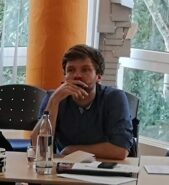Publications

"Property: Authority Without Office?"
Rutger Claassen & Larissa Katz, Property: Authority Without Office?, Journal of Law and Political Economy, 3(3)2023.
This paper is about the relationship between property and power, focusing on the analysis presented in David Robé's book "Property, Power, and Politics." The authors agree with much of Robé's work but criticize his rejection of ownership as an office....
Read more
Elements for a Normative Theory of Privatization
Rutger Claassen, "Elements for a Normative Theory of Privatization." Erasmus Journal for Philosophy and Economics 16, no. 2 (2023): 107-135.
In this paper, an instrumentalist approach to the legitimacy of privatization is endorsed, while Heath’s welfarist-economic version is challenged. It is argued that public interests must go beyond Pareto-efficiency, that market analysis must include power distribution, and that alternative ownership...
Read more
The Corporate Social Assessment. Making Public Purpose Pay
Michael Bennett and Rutger Claassen, "The corporate social assessment: making public purpose pay." Review of Social Economy 82, no. 1 (2024): 147-175.
Corporations can be powerful engines of economic prosperity, but also for the public good more broadly conceived. But they need to be properly incentivized to fulfil these missions. We propose an innovative plan called the Corporate Social Assessment (CSA).
Taming the Corporate Leviathan. How to Properly Politicise Corporate Purpose?
Michael Bennett and Rutger Claassen, "Taming the Corporate Leviathan: How to Properly Politicise Corporate Purpose?." In Wealth and Power, pp. 145-165. Routledge, 2022.
This chapter analyses, historicises, and radicalises this call for purpose. We schematise the history of the corporation into two main purpose/power regimes, each combining a way of thinking about corporate purpose with specific institutions to hold corporate power to account.
"Loyalty to client, conviction, or constitution? The moral responsibility of public professionals under illiberal state pressures"
Rutger Claassen, Loyalty to client, conviction, or constitution? The moral responsibility of public professionals under illiberal state pressures, Legal Ethics, 26(1)(2023).
This paper is about the the moral dilemma faced by public professionals in contexts with authoritarian leadership, examining whether they should resist illiberal pressures from the state or comply. Using a fiduciary framework based on Thomas Hobbes' theory of authorization/representation,...
Read more
"Introduction to Symposium on Jean-Philippe Robe, Property, Politics and Power: Why we need to rethink the world power system"
Rutger Claassen and Tully Rector, Introduction to Symposium on Jean-Philippe Robe, Property, Politics and Power: Why we need to rethink the world power system, Journal of Law and Political Economy, 3(3)2023
his paper is about under the umbrella of Law and Political Economy (LPE), the paper challenges established views that insulate markets and dominant actors from critique, arguing for new analytical approaches that integrate the economy into democratic life. It introduces...
Read more
"Wealth Creation Without Domination"
Rutger Claassen, Wealth Creation Without Domination. The Fiduciary Duties of Corporations, Critical Review of International Social and Political Philosophy. 26(7)(2023)
This paper argues for a double-fiduciary theory of corporations, whereby corporations have a duty to create wealth for society while also not dominating others in the economy. This is owed to the state/society, which has mandated shareholders as 'proximate beneficiaries'...
Read more
"Political Theories of the Business Corporation"
Rutger Claassen, Political Theories of the Business Corporation, Philosophy Compass. 18(1)(2023),
This article discusses corporate power, including how it is constituted, the purpose for which it should be exercised, and how it should be governed. Three political theories of the corporation are presented: concession theories, which emphasize the role of the...
Read more
"Corporate Governance en het Maatschappelijk Belang" (in Dutch)
Rutger Claassen, Dirk Schoenmaker KVS Preadviezen Corporate Governance en het Maatschappelijk Belang
Can we hold companies accountable for social problems, such as climate emissions, privacy, worker exploitation? And if so, what does that mean for corporate governance? Who should be able to participate and co-decide, if companies are given a larger social...
Read more
"Wealth and Power: Philosophical Perspectives"
Michael Bennett, Huub Brouwer, Rutger Claassen, Wealth and Power: Philosophical Perspectives
Is the concentration of wealth a threat to democratic processes? And what can we do about it? Last week the volume "Wealth and Power: Philosophical Perspectives, (Routledge, London, 2022)" co-edited with Michael Bennett and Huub Brouwer, was released. Part I...
Read more
"The Corporate Power Trilemma"
Rutger Claassen, The Corporate Power Trilemma’, with Michael Bennett, in: Journal of Politics 84(4)(2022): 2094-2106
Authors critical of corporate power focus almost exclusively on one solution: bringing it under democratic control. However important this is, there are at least two other options, which are rarely discussed: reducing powerful firms’ size and influence, or accepting corporate...
Read more
"Can we Escape Privatization Dilemmas? Reflections on Cordelli’s The Privatized State’"
Rutger Claassen, Can we Escape Privatization Dilemmas? Reflections on Cordelli’s The Privatized State’, in: Jurisprudence. An International Journal of Legal and Political Thought13(3)(2022), 421-426.
In the last decades, a broad privatisation movement has swept many nations, leading toformerly public services being outsourced to a variety of private parties.This paper looks at Chiara Cordelli’s The Privatized State. She works out a philosophically in-depth analysis of...
Read more
"Our corporate overlords"
Rutger Claassen, ‘Our corporate overlords’, co-authored with Michael Bennett, The Journal of Politics, Blogpost.
In this blogpost we examine the costs of the three most popular suggested strategies to respond to growing corporate power: democratizing corporate governance, anti-trust-inspired economic sanctions, or accepting corporate power as a necessary evil. We argue that all of these...
Read more
"The Ethics of Moral Hazard Revisited"
Rutger Claassen, ‘The Ethics of Moral Hazard Revisited’, in: Norbert Gaillard, Juan Flores, Rick Michalek (eds). Moral Hazard. A Financial, Legal, and Economic Perspective (London: Routledge, 2022), pp. 15-35
This paper is about: Historically, the term “moral hazard” came with strong moral connotations, as moral blame attached to those abusing insurance schemes. However, economists have taken moral hazard as a technical term, seeing individuals’ risk-adjusting behavior simply as a...
Read more
"Property and Political Power: Neo-Feudal Entanglements"
Property and Political Power: Neo-Feudal Entanglements’, in: John Christman (ed.), Positive Liberty: Past, Present, and Future (Cambridge: Cambridge University Press, 2021). Pp. 217-235.
This paper is about Hobbes is commonly treated as a defender of the so-called concession theory, which traces the legitimacy of corporations to their being chartered by sovereign state authorities for public purposes. However, a close reading of the crucial...
Read more
"Making Power Explicit. Why Liberal Egalitarians Should Take (Economic) Power Seriously"
Rutger Claassen, ‘Making Power Explicit. Why Liberal Egalitarians Should Take (Economic) Power Seriously’, with Lisa Herzog, in: Social Theory & Practice. 47 (2)(2021): 221-246
This paper is about in this paper we argue that liberal-egalitarian theorists of justice should take power, especially economic power, seriously and make it explicit. We argue that many theories of justice have left power implicit, relying on what we...
Read more
"Why Economic Agency Matters: An Account of Structural Domination in the Economic Realm"
Rutger Claassen, ‘Why Economic Agency Matters: An Account of Structural Domination in the Economic Realm’, co-authored with Lisa Herzog, in: European Journal of Political Theory. 20(3)(2021): 465-485.
This paper is about how a positive notion of economic agency is needed as a criterion for what makes economic structures dominating and potentially unjust. We propose a notion of economic agency, which we relate to a more general notion...
Read more
"Hobbes Meets the Business Corporation"
Rutger Claassen, "Hobbes Meets the Modern Business Corporation" in Polity 53 (2021).
Political theory today has expanded its scope to debate business corporations, conceiving of them as political actors, not (just) private actors in the market place. This article shows the continuing relevance of Thomas Hobbes’s work for this debate. Hobbes is...
Read more
"The legitimacy of corporations in a liberal democracy"
Rutger Claassen, “The legitimacy of corporations in a liberal democracy", Working Paper for the Scientific Council for Government Policy (WRR).
In the new Working Paper The legitimacy of corporations in a liberal democracy, Prof. Rutger Claassen discusses the nature and role of corporations from several political-thepretical perspectives. These perspectives each contain their own understanding of the societal function of corporations...
Read more

"Can business corporations be legally responsible for structural injustice? The social connection model in (legal) practice"
Barbara Bziuk, Can business corporations be legally responsible for structural injustice? The social connection model in (legal) practice. Critical Review of International Social and Political Philosophy, 2022.
In May 2021, Royal Dutch Shell was ordered by the Hague District Court to significantly reduce its CO2 emissions. This ruling is unprecedented in that it attributes the responsibility for mitigating climate change directly to a specific corporate emitter. Shell...
Read more

"In Defense of Shirking in Capitalist Firms: Worker Resistance vs. Managerial Power"
Uğur Aytaç, In Defense of Shirking in Capitalist Firms: Worker Resistance vs. Managerial Power, (2023).
This paper challenges the conventional view of shirking (avoiding job responsibilities) as inherently unethical and reframes it as a form of resistance by workers against unjust managerial power. Drawing on sociological evidence, the author proposes a normative perspective that views...
Read more
What is the Point of Social Media? Corporate Purpose and Digital Democratization
Ugur Aytac, "What is the Point of Social Media? Corporate Purpose and Digital Democratization." Philosophy & Technology 38, no. 1 (2025): 26.
This paper proposes a new normative framework to think about Big Tech reform. Focusing on the case of digital communication, I argue that rethinking the corporate purpose of social media companies is a distinctive entry point to the debate on...
Read more
Big Tech, Algorithmic Power, and Democratic Control
Ugur Aytac, "Big Tech, Algorithmic Power, and Democratic Control." The Journal of Politics 86, no. 4 (2024): 1431-1445.
This article argues that instituting Citizen Boards of Governance (CBGs) is the optimal strategy to democratically contain Big Tech’s algorithmic powers in the digital public sphere. I show why this is a better approach than ordinary state regulation or relying...
Read more
"Ideology Critique without Morality: A Radical Realist Approach"
Uğur Aytaç, Ideology Critique without Morality: A Radical Realist Approach, with Enzo Rossi. Forthcoming in the American Political Science Review.
What is the point of ideology critique? Prominent Anglo-American philosophers recently proposed novel arguments for the view that ideology critique is moral critique, and ideologies are flawed insofar as they contribute to injustice or oppression. They criticize that view and...
Read more
"Digital Domination: Social Media and Contestatory Democracy"
Uğur Aytaç, Digital Domination: Social Media and Contestatory Democracy. Political Studies, 2022.
This article argues that social media companies’ power to regulate communication in the public sphere illustrates a novel type of domination. The idea is that, since social media companies can partially dictate the terms of citizens’ political participation in the...
Read more

"The Form of the Firm: A Normative Political Theory of the Corporation." (Book review)
Chi Kwok, C. Abraham A. Singer: The Form of the Firm: A Normative Political Theory of the Corporation. Res Publica (2021).
The Form of the Firm is an extraordinary and highly original book. It is one of the most rigorous and comprehensive interdisciplinary works that combines normative political theory with business ethics and economics addressing issues relating to justices in and...
Read more
"John Rawls and A Theory of Justice in the Age of Neoliberalism" (in Chinese),
Chi Kwok, (Accepted), "John Rawls and A Theory of Justice in the Age of Neoliberalism" (in Chinese), in Twenty-First Century.
This article is part of a special issue dedicated to celebrating John Rawls's centenary, in the journal Twenty-First Century (https://www.cuhk.edu.hk/ics/21c/en/introduction.html). The article discusses the contributions of A Theory of Justice to debates in economic justice, with a specific focus on...
Read more
"Work Autonomy and Workplace Democracy: The Polarization of the Goods of Work Autonomy in the Two Worlds of Work"
Chi Kwok, “Work Autonomy and Workplace Democracy: The Polarization of the Goods of Work Autonomy in the Two Worlds of Work” in Review of Social Economy 78 (2020).
Chi Kwok’s article “Work Autonomy and Workplace Democracy: The Polarization of the Goods of Work Autonomy in the Two Worlds of Work” won the Helen Potter Award from the Association for Social Economics (ASE) for the best article published in...
Read more
“Guerilla Capitalism and the Platform Economy: Governing Uber in China, Taiwan, and Hong Kong”
Chi Kwok (with Ngai Keung Chan), “Guerilla Capitalism and the Platform Economy: Governing Uber in China, Taiwan, and Hong Kong” in Review of Information, Communication and Society.
Platforms play an increasingly important role in organizing our economic and political systems globally. Drawing on the varieties of capitalism (VoC) approach and the notion of regulatory entrepreneurship, this article introduces the concept of guerilla capitalism to describe an emerging...
Read more
"Epistemic injustice in workplace hierarchies: Power, knowledge and status"
Chi Kwok, "Epistemic injustice in workplace hierarchies: Power, knowledge and status" in Philosophy and Social Criticism (2020).
Contemporary workplaces are mostly hierarchical. Intrinsic and extrinsic bads of workplace hierarchies have been widely discussed in the literature on workplace democracy and workplace republicanism. However, a distinctively intrinsic relational bad, epistemic injustice in the workplace, has largely been neglected...
Read more
"Towards a Political Theory of Data Justice: A Public Good Perpsective:"
Chi Kwok and with Ngai Keung Chan, “Towards a Political Theory of Data Justice: A Public Good Perpsective” in Journal of Information, Communication & Ethics in Society.
This article develops an interdisciplinary political theory of data justice by (1) connecting three major political theories of the public good with empirical studies about the functions of big data and (2) offering normative principles for restricting and guiding the...
Read more
Review Abraham Singer's The Form of the Firm
Chi Kwok, "Abraham A. Singer: The Form of the Firm: A Normative Political Theory of the Corporation: Oxford: Oxford University Press, 2019, (2022): 401-406.
The Epistemology of Corporate Power: The Limits of the Firm–State Analogy
Chi Kwok, "The Epistemology of Corporate Power: The Limits of the Firm–State Analogy." Journal of Applied Philosophy 42, no. 1 (2025): 197-216.
Political theorists frequently utilize the ‘firm–state analogy’ (FSA) to support the arguments for democratic governance in firms. This article presents the FSA as an analogy with both justificatory and epistemic functions.
Read more

"Market Socialism as a Form of Life"
Tully Rector, "Market Socialism as a Form of Life" in Review of Social Economy (2021)
Capitalism is not only an economic order, but a form of life. Market socialism is proposed as an alternative, and should be assessed according to the standards of second-order coherence and social rationality that make a form of life habitable....
Read more
Capital, Autonomy, and the Limits of Corporate Critique
Tully Rector, "Capital, Autonomy, and the Limits of Corporate Critique." Journal of Law and Political Economy 3, no. 3 (2023).
In this paper, the system of advantages afforded by corporate structure is examined through a more robust conception of capital. Robé’s treatment of property and its power-conferring features is critiqued, and it is argued that the normative reasons condemning corporate...
Read more
Productive Freedom
Tully Rector, "Productive freedom." Critical Review of International Social and Political Philosophy (2023): 1-24.
This paper presents and defends a new conception of freedom as a value in the sphere of economic production. It challenges the common, proprietarian contractual view of economic liberty
Read more

"The Boundary Problem in Workplace Democracy: Who Constitutes the Corporate Demos?"
Philipp Stehr, The Boundary Problem in Workplace Democracy: Who Constitutes the Corporate Demos? Political Theory.
This article brings to bear findings from the debate on the boundary problem in democratic theory on discussions of workplace democracy to argue that workplace democrats’ focus on workers is unjustified and that more constituencies will have to be included...
Read more
"Expropriation as a measure of corporate reform: Learning from the Berlin initiative"
Philipp Stehr, Expropriation as a measure of corporate reform: Learning from the Berlin initiative, European Journal of Political Theory, (2023).
This paper discusses a citizens' movement in Berlin that supports the expropriation of housing corporations, a proposal that gained significant approval in a 2021 referendum. The paper contributes to the debate on the democratic accountability of business corporations by advocating...
Read more



